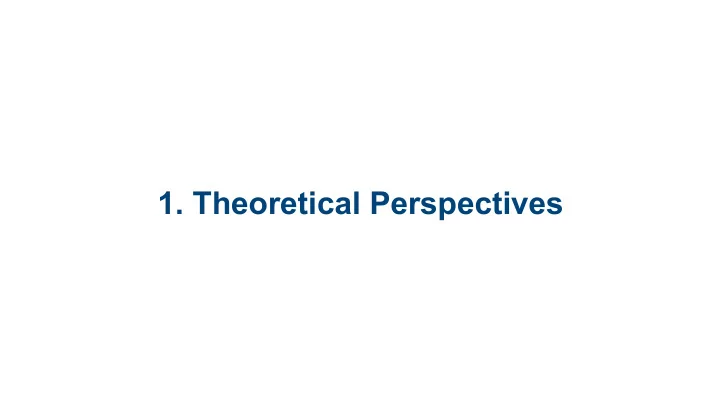

1. Theoretical Perspectives
Theories: Big ideas • To study development, start with models or theories • No theory can explain all aspects of development. • What theories explain different aspects of development?
1.1 Evolutionary 1.2 Biological 1.3 Learning (Behaviorism) 1.4 Cognitive Development
1.5 Social Cognitive (Social Learning) 1.6 Sociocultural 1.7 Ecological 1.8 Psychodynamic
1.1 Evolutionary
Development by species adaptations • “Ontogeny recapitulates phylogeny” • Developmental traits from past adaptations • Example: Men’s late-life reproductive capability from successful adaptation
1.2 Biological
Development by heredity • Genes define many traits • Some genes determine • Example: genes determine hair color • Some genes predispose • Example: genes give potential for alcoholism
1.3 Learning (Behaviorism)
Development by modifying behavior • Emphasis on behavior, not thought or feeling • Example: Study parents’ punishment style, not attitude • Emphasis on learning new behaviors or extinguishing old behaviors
Learn by consequences • Positive reinforcement = pleasant result (reward) • Quick reward best to reinforce new behavior • Negative reinforcement = take away unpleasant threat • Example: Do chores to prevent (more) nagging
Learn by consequences • Punishment = unpleasant result (physical or social) • Consequences not emotional • Reinforcement from parent, teacher, environment
1.4 Cognitive Developmental
Development by thinking/changing • Building and modifying concepts about reality • “Information processing” in brain to learn and organize knowledge
Development by thinking/changing • Emphasis on thought processes • Make learning more efficient • Make applying knowledge more effective
1.5 Social Cognitive (Social Learning)
Development by observing and imitating • Learning from others, with or without their help • Studying role models • Example: Playing dress-up like adult • Example: Viewing and reviewing experts’ performances
1.6 Sociocultural
Development by social influences • Emphasizes impact of surrounding environment • Cultural expectations, attitudes, customs • Economic/class status • Religion
1.7 Ecological
Development by total of environmental forces • Impact of people, place and time • Self • Nuclear/extended family • Local/regional setting • Time in history, events, available technology
1.8 Psychodynamic
Development by unconscious urges • Emphasizes impact and guidance of unconscious mind • Forgotten childhood experiences • Innate motives and urges triggered at certain ages
Recommend
More recommend